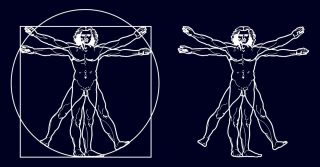Pornography
Pornography, Mass Media, and Male Body Image
Does porn create body-image issues for men, too?
Posted April 18, 2023 Reviewed by Hara Estroff Marano
Key points
- Men can struggle with negative self-perceptions related to their appearance just as women can.
- Porn impacts male self-esteem is through the portrayal of unrealistic, idealized, often enhanced or photoshopped male bodies.
- Men who struggle with body image can, with a bit of effort, develop a healthy and positive relationship with their appearance.

We hear a lot about how porn impacts women, including the fact that it can create body-image issues for them. What we don’t hear about is how the self-image of men can be similarly affected. And why wouldn’t it be? The simple truth is that men can struggle with negative self-perceptions related to their appearance just as women can.
As with females, the media’s consistently unrealistic portrayal of male bodies has created societal expectations of how a man should look, sound, and act. While expectations for males tend to be more forgiving than the expectations heaped on females, men can still struggle with body shame and low self-esteem. And, as we see with women, pornography can exacerbate the issues.
The primary way in which porn affects male self-esteem is through the portrayal of unrealistic, idealized, often enhanced or photoshopped male bodies. In pornography, men typically have muscular physiques, large and rock-hard penises, perfect hair, and smooth, unblemished skin. Even when this is not true, as we see with certain types of fetish porn, the men presented still represent a stylistic ideal that most cannot fulfill.
Basically, porn can create a distorted image of what women (and other men) consider attractive and desirable in male bodies. Men who don’t fit this narrow standard can feel shame, embarrassment, and insecurity not just about their bodies but about life in general.
The most common body issues for men are:
- Dissatisfaction with their muscle mass and overall physique. Both the media and pornography typically portray men with broad shoulders and chiseled abs as what a man should look like, but for most men, even men who visit the gym religiously, this is simply not possible. Some men will turn to steroids and other performance-enhancing supplements in an attempt to measure up.
- Dissatisfaction with hair loss. As men age, many experience male pattern baldness, causing them to feel self-conscious and unattractive. Those who try hairpieces, hair replacement, and any number of miracle cures are typically disappointed, experiencing anxiety, depression, and diminished self-esteem.
- Dissatisfaction with penis size and erection strength. Pornography (and society in general) seems to value penis size and rock-hard erections above all else. These are expectations that few men can live up to. Even men with a large penis may struggle, as achieving and maintaining an erection is typically not as effortless for any man as it appears in pornography. Pills like Viagra, Levitra, and Cialis can help, but not everyone can safely take them, and the medications sometimes have unpleasant side effects.
Other struggles may include:
- Fears about too much or not enough body hair.
- Shame about scars or other physical imperfections.
- Fears about body odor or sweating.
- Anxiety about physical limitations.
In addition to body-image issues, pornography may contribute to a culture of toxic masculinity in which men are taught (and therefore feel the need) to conform to rigid gender norms and expectations, including hypermasculinity, aggression, competitiveness, going it alone, and the like. The expectations can impact all aspects of life—work, home, play, and sex. And for men who are not comfortable with such a hypermacho approach, self-esteem can diminish.
The simple truth is that porn- and media-driven body-image issues in men can be significant, leading to a range of negative outcomes. Most notable among them are low self-esteem, depression, anxiety, shame, eating disorders, and even substance use disorders (especially with steroids and erection enhancers). Over time, some men who struggle with body image may withdraw from social situations and intimate relationships, becoming emotionally isolated from friends, family, and even their long-term partners.
To overcome such struggles, men should consider the following steps:
- Challenge the body-image “norms” presented by porn and the media by observing other men in the real world. In doing this, men will notice that hardly anyone lives up to the television standard.
- Seek male role models who embrace diversity in appearance and behavior. At the same time, men should pay attention to how the confidence of male role models, despite “flaws” in their appearance, attracts people.
- Focus on overall health and wellness rather than on just physical appearance. Doing this can transform healthy eating and trips to the gym from “chores” to enjoyment. Better yet, when we feel better physically, we feel better mentally.
- If body image issues are severe, seek professional counseling. A good therapist can help men explore and counteract negative self-talk while building self-compassion and a more realistic sense of self.
- Join support groups such as Overeaters Anonymous and simple discussion/support groups for men at churches, mental health centers, and elsewhere.
The good news here is that men who struggle with body image can, with a bit of effort, develop a healthy and positive relationship with their appearance. Though porn and other media representations of the idealized male can easily undermine the self-esteem and confidence of any man, these issues can be overcome with healthy habits and an updated, more realistic mindset.


